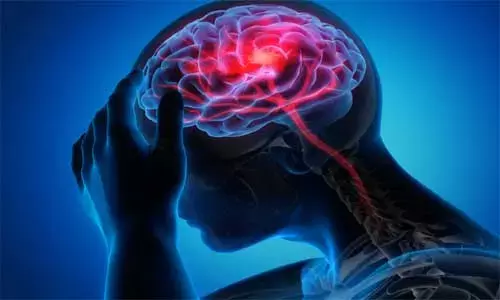- Home
- Medical news & Guidelines
- Anesthesiology
- Cardiology and CTVS
- Critical Care
- Dentistry
- Dermatology
- Diabetes and Endocrinology
- ENT
- Gastroenterology
- Medicine
- Nephrology
- Neurology
- Obstretics-Gynaecology
- Oncology
- Ophthalmology
- Orthopaedics
- Pediatrics-Neonatology
- Psychiatry
- Pulmonology
- Radiology
- Surgery
- Urology
- Laboratory Medicine
- Diet
- Nursing
- Paramedical
- Physiotherapy
- Health news
- Fact Check
- Bone Health Fact Check
- Brain Health Fact Check
- Cancer Related Fact Check
- Child Care Fact Check
- Dental and oral health fact check
- Diabetes and metabolic health fact check
- Diet and Nutrition Fact Check
- Eye and ENT Care Fact Check
- Fitness fact check
- Gut health fact check
- Heart health fact check
- Kidney health fact check
- Medical education fact check
- Men's health fact check
- Respiratory fact check
- Skin and hair care fact check
- Vaccine and Immunization fact check
- Women's health fact check
- AYUSH
- State News
- Andaman and Nicobar Islands
- Andhra Pradesh
- Arunachal Pradesh
- Assam
- Bihar
- Chandigarh
- Chattisgarh
- Dadra and Nagar Haveli
- Daman and Diu
- Delhi
- Goa
- Gujarat
- Haryana
- Himachal Pradesh
- Jammu & Kashmir
- Jharkhand
- Karnataka
- Kerala
- Ladakh
- Lakshadweep
- Madhya Pradesh
- Maharashtra
- Manipur
- Meghalaya
- Mizoram
- Nagaland
- Odisha
- Puducherry
- Punjab
- Rajasthan
- Sikkim
- Tamil Nadu
- Telangana
- Tripura
- Uttar Pradesh
- Uttrakhand
- West Bengal
- Medical Education
- Industry
Experts offer guidelines for treatment of Stroke during Covid 19 pandemic

Stroke researchers at the University of Cincinnati have released a new report recommending the proper protocol for delivering lifesaving treatment to stroke patients during the COVID-19 pandemic.
The report, published in Stroke, a journal of the American Heart and American Stroke associations, is timely as more data emerges that patients with COVID-19, even young, otherwise healthy patients, are experiencing strokes. The authors emphasize that diagnosis with COVID-19 should not prevent patients from receiving this time-sensitive treatment.
"Endovascular treatment for stroke involves the use of small catheters inserted from the groin or the arm into the blood vessels of the brain to remove a clot and restore blood flow to the brain," says Dr. Aaron Grossman, assistant professor in the department of neurology and rehabilitative medicine and a UC Health physician who is also the corresponding author on the report. "Opening a brain artery can reverse the effects of the stroke, and for some patients, leads to a quicker recovery time. In this current climate, the treatment presents challenges that doctors never previously needed to consider."
"We needed to find a process for treating patients using endovascular therapy in the COVID-19 era that would keep our staff safe while we cared for these patients as quickly as possible," says Dr. Matthew Smith, a neurocritical care fellow and UC Health physician who is the first author on the report.
Researchers reviewed published and real-time anecdotal experiences of providers caring for COVID-19 patients nationally and internationally. As the first patients with COVID-19 were arriving to UC's Comprehensive Stroke Center, members of every team who cared for these patients met via video to establish recommendations for care.
"We highlighted three populations of potential patients: patients with suspected COVID-19 who come into the emergency department; patients with COVID-19 who are already in the hospital and then develop stroke; and stroke patients without COVID-19 who are cared for at a hospital with constrained resources due to COVID-19, including access to [personal protective equipment], ventilators, ICU beds and staff, " Grossman explains. "Our proposed algorithm helped us decide recommended points of care. It considers the American Heart/American Stroke associations endovascular treatment guidelines, the safety of patients and staff, predictors of death in COVID-19 patients and the appropriate use of scarce resources."
The working group concluded that a COVID-19 diagnosis should not prevent doctors from using endovascular therapy to treat a patient's severe stroke.
"However, we have to use extreme caution when preparing the patient, to keep staff safe," Smith adds, "and during this time of extreme resource limitation, we have to be prepared to modify our current protocols to provide the best stroke care possible for all patients in the Tristate."
In publishing these recommendations, Grossman says the UC/UC Health Stroke Team researchers demonstrate how "adapting an existing and evolving workflow requires input, coordination and engagement across hospital units and disciplines and believe a multidisciplinary approach that is proactive rather than reactive will best serve patients with stroke during the COVID-19 pandemic."
Hina Zahid Joined Medical Dialogue in 2017 with a passion to work as a Reporter. She coordinates with various national and international journals and association and covers all the stories related to Medical guidelines, Medical Journals, rare medical surgeries as well as all the updates in the medical field. Email: editorial@medicaldialogues.in. Contact no. 011-43720751
Dr Kamal Kant Kohli-MBBS, DTCD- a chest specialist with more than 30 years of practice and a flair for writing clinical articles, Dr Kamal Kant Kohli joined Medical Dialogues as a Chief Editor of Medical News. Besides writing articles, as an editor, he proofreads and verifies all the medical content published on Medical Dialogues including those coming from journals, studies,medical conferences,guidelines etc. Email: drkohli@medicaldialogues.in. Contact no. 011-43720751


